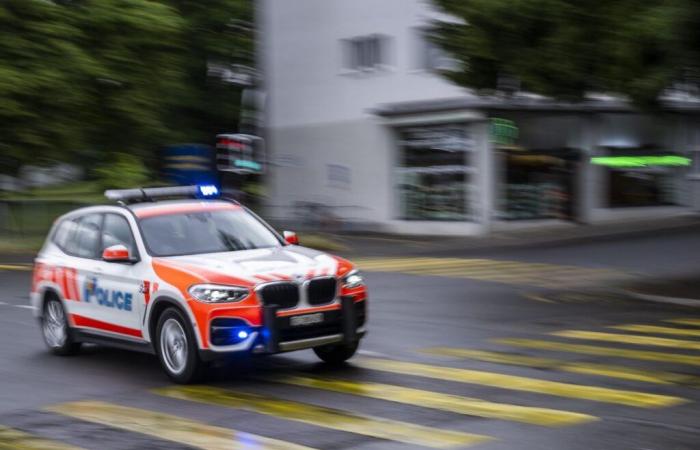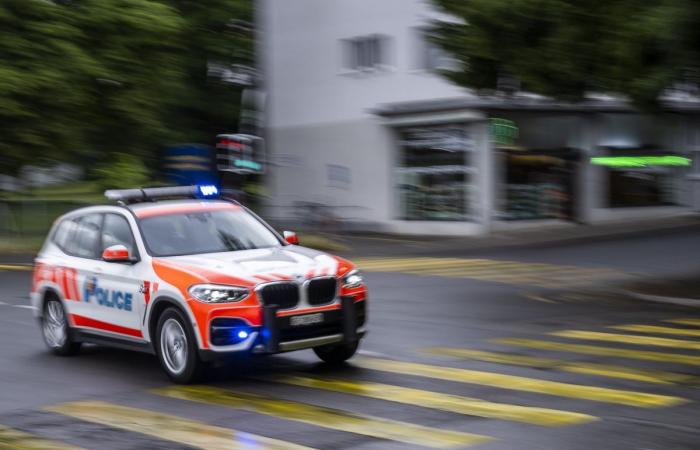ThoseJustice in Geneva –
Police officer pardoned after excessive speeding
The official who drove too fast during an intervention saw her sanction erased by a commission of the Grand Council. Other convicts benefited from this political “great pardon”.
Published today at 05:00
The inspector was convicted for speeding at 52 km/h at the entrance to Troinex in January 2017 (illustrative image).
LAURENT GUIRAUD
Subscribe now and enjoy the audio playback feature.
BotTalk
- An inspector escaped her criminal sanction for speeding.
- The pardons commission canceled his community service sentence.
- Every year, requests of this type reach MPs.
Two years ago, a seasoned inspector was convicted of speeding at 52 km/h at the entrance to Troinex in January 2017. The civil servant, who was driving as part of her work, was fined, after a judicial marathon of several years, of 280 hours of community service (TIJ) suspended. The “Tribune de Genève” learned that the pardons commission of the Grand Council erased this sanction in a decision rendered on November 19.
This instance was probably sensitive to the particular context of this speed violation. “The unfailing commitment of my principal to the service of the community must be saluted,” reacts her lawyer, Me Roman Jordan. The decision of the Grand Council recognizes this, by recognizing the constraints and particularities of the police profession.
At the end of 2016, police were looking for Travelers involved in car theft. A gang had already stolen 48 vehicles in the canton. According to a police report, its members did not hesitate “to take great risks to act aboard large-engine vehicles and forced police roadblocks. One of the suspects is known to the French services for a murder case in 1998.”
Flashed at 102 km/h
Alerted by a colleague to the presence of a suspect at Troinex, the inspector set out to look for him. A radar then flashed it on the Marsillon road at 102 km/h (safety margin of 6 km/h deducted) on a section limited to 50 km/h.
On the night of February 3 to 4, the suspects were spotted in La Croix-de-Rozon. The police, including the defendant, intervene in force. The thugs hit a user’s car and injure him. They rushed towards the police officers and brushed past the inspector less than a meter away before fleeing.
The same night, another patrol engaged in the same intervention was flashed on the Annecy road at 126 km/h, while the speed was limited to 50 km/h. The driver was sentenced in 2020 to 360 hours of suspended TIJ.
Fabrice A. rejected
Like this inspector, dozens of convicted people try each year to obtain their partial or total pardon. Fabrice A., the murderer of Adeline M., had taken the step saying “broken and tired” by detention. His request examined by the Grand Council in 2011 was rejected. Unanimously.
What are the criteria examined by MPs? “There is no specifically defined one,” notes Laurent Koelliker, the head of the Grand Conseil. This is a case-by-case assessment of the members of the commission.”
At the end of the 1990s, “Le Matin” echoed a historic boom in clemency appeals in 1998. There were then 121 condemned people who appealed to the Grand Council. Nearly half of them had obtained a partial or total reduction of their sanction.
The decision to grant pardon is generally based not on legal grounds, but on grounds of equity, criminal policy, economics or pure indulgence. Example of a grant by pure indulgence: a convict who saves a child from drowning.
In 2017, an undocumented Bolivian woman convicted of illegal residence after filing a complaint following an attack had her conviction overturned. Earning her living by working as a cleaning lady, she was sentenced to a 60-day suspended fine, the same sentence as the compatriot who had “smashed” her nose in a bar.
Forgiveness after rebuilding your life
The same year, deputies reduced the prison sentence of a man convicted in 2001, notably for theft and aggravated banditry. He had been released by mistake before his trial and had led an uneventful life until his arrest in 2017. The Grand Council had considered that the defendant, defended by Me Jordan was no longer a delinquent.
In 2015, deputies reduced from 5 years to 20 months the prison sentence of an Indian restaurateur from Pâquis who had wanted to have his wife’s lover killed. The deputies believed that his expulsion from Switzerland would have been harmful for his children.
Last year, the pardons commission rejected a young unemployed man from Annemasse who wanted two lines from his criminal record to disappear. One for theft. The other concerned a fine for free-riding on public transport. For lack of payment, the log had been converted into days in prison. The same year, an inmate at Champ-Dollon sent the Grand Conseil a summary letter without arguments. The man convicted in particular for drug trafficking got nothing…
As recently as 2023, a septuagenarian drug addict successfully invoked her precarious financial situation. The number of his days in prison for thefts was reduced in favor of a therapeutic measure in an institution.
These political appeals sometimes make it possible to highlight procedures which have not been judged in Geneva. Following a vacation in Sicily in 1997 with his wife’s family, the applicant was accused of having committed sexual acts on his daughter, aged barely 3 years old. The man returned to Switzerland the day after the events while his wife filed a complaint against him in Italy. The defendant was sentenced in absentia to eight years in prison.
The man later remarried and had two more children. In 2018, he traveled to Morocco for vacation. The subject of an international arrest warrant, he was arrested on his arrival then extradited to Italy, from where he began serving his sentence, before requesting his transfer to Switzerland to serve the balance of his detention there. .
In 2022, he unsuccessfully asked the Grand Council to pardon him for the remainder of his sentence.
The previous year, a violent bouncer appealed for clemency from the Grand Council, who wanted nothing to do with it. It must be said that the man had been convicted three times for beatings in a nightclub and even for shooting into a car in front of a nightclub… According to the commission’s report, the man was tried in absentia by the Criminal Court, since he neither appeared nor apologized, nor did he appear before the Court of Justice on appeal. For all of these facts, he was sentenced to a sentence privative sentence of four years.
The previous year, the banker who had ordered the murder of his wife in Chêne-Bougeries in 2012 also faced a refusal before the Grand Council. The Legislature, which followed the commission as often, refused to reduce the prison sentence imposed by the courts, namely eleven years and six months in prison. His wife survived this assassination attempt.
Note that the commission is competent to decide “minor” cases on its own. Namely for a monetary penalty not exceeding 180 day fines, TIJ, sentences not exceeding 6 months in prison and fines equal to or less than 10,000 francs. For the rest, the last word rests with the Grand Council after prior notice from the commission.
“Latest news”
Want to stay on top of the news? “Tribune de Genève” offers you two meetings per day, directly in your email box. So you don’t miss anything that’s happening in your canton, in Switzerland or around the world.
Other newsletters
Log in
Did you find an error? Please report it to us.
15 comments







